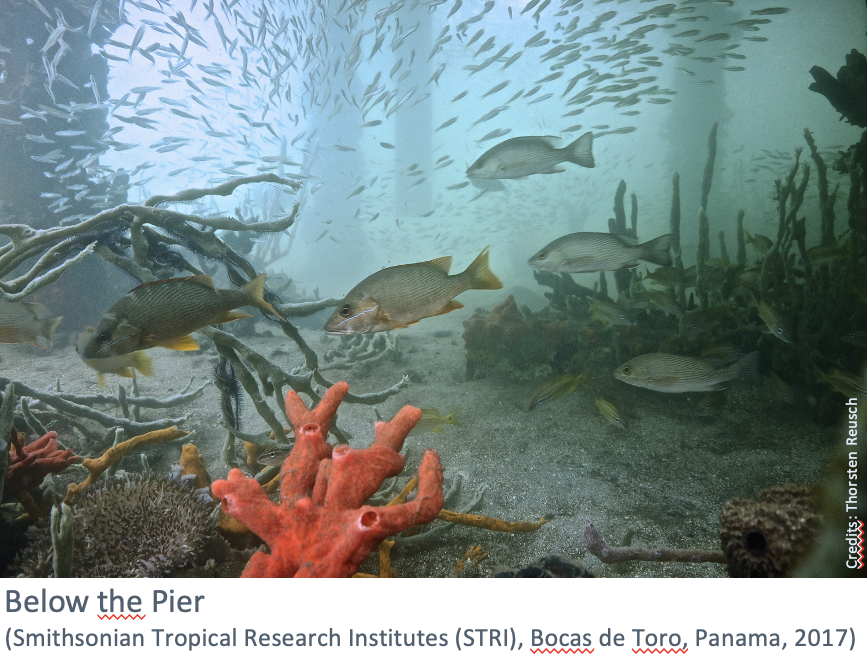#OceanHealth2022
The Symposium is hosted by Kiel Marine Science (KMS) at Kiel University and GEOMAR Helmholtz Centre for Ocean Research Kiel as an in-person event in Kiel, Germany.
Find the symposium on twitter #OceanHealth2022
The registration has been closed.
News: You can find information about the site programme here.
Register to join here or mail to oceanhealth.symposium@kms.uni-kiel.de for further information.
GUIDING QUESTIONS
* Are marine diseases increasing through global change?
* Are fundamentally novel diseases emerging?
* How can we conceptualize the dual nature of marine disease as trigger of mass mortality versus essential ecosystem regulator?
* What are the links between ecosystem integrity, marine disease, and human health?
* How can we best manage the societal and economic implications of marine diseases, epidemic risks, and microbial interventions under uncertainty?
Meet early career scientists and established researchers from a broad range of disciplines to exchange views on ocean disease, ocean extremes, ocean health, and related governance options to articulate a One Ocean Health perspective and its connection to the United Nations Decade of Ocean Science for Sustainable Development. The programme includes keynotes, plenary sessions with panel discussions, and an evening poster session.
SPEAKERS
Isabelle Arzul (IFREMER, La Tremblade, France)
Arne Biastoch (GEOMAR & Kiel University, Germany)
Alicia Bruzos (The Francis Crick Institute, UK &
Universidade de Santiago de Compostela, Spain)
Claire Gachon (MNHM Paris, France & SAMS, Oban, UK)
Lone Grønbæk Jørgensen (SDU, Esbjerg, Denmark)
Kevin Lafferty (US Geological Survey & UC Santa Barbara, USA)
Raquel Peixoto (KAUST, Saudi Arabia)
Christina Pettan-Brewer (University of Washington, Seattle, USA &
ECOHA (One Health Brasil), OHLAIC)
Forest Rohwer (San Diego State University, USA)
Lauren Schiebelhut (UC Merced, USA)
Ursula Siebert (University of Veterinary Medicine, Hannover, Germany)
David Thieltges (NIOZ, Den Hoorn, The Netherlands)
Assaf Vardi (Weizmann Institute, Rechovot, Israel)
INTERNATIONAL STEERING COMMITTEE
Lora Fleming (ECEHH, Exeter, UK)
Ute Hentschel Humeida (GEOMAR & Kiel University, Germany)
Raquel Peixoto (KAUST, Saudi Arabia)
Thorsten Reusch (GEOMAR & Kiel University, Germany)
Marie-Catherine Riekhof (KMS, CeOS at Kiel University, Germany)
David Thieltges (NIOZ, The Netherlands)
REGISTRATION AND CONFERENCE FEE
Pre-registration is required. Regular conference fee: 80 EUR. A poster contribution is strongly encouraged. Participation in Kiel is limited to 120 participants.
For information, please contact Frauke Pescheck: oceanhealth.symposium@kms.uni-kiel.de
The Symposium is registered as Ocean Decade Activity.
Find out more about the United Nations Ocean Decade of Ocean Science for Sustainable Development and join the Global Stakeholder Forum to keep informed, connect to ocean experts, and learn about the Ocean Decade.
The Symposium is hosted by Kiel Marine Science (KMS) at Kiel University and GEOMAR Helmholtz Centre for Ocean Research Kiel and supported by the Center for Ocean and Society (CeOS) at KMS, the CRC 1182 on Metaorganisms and the Topic 6: Marine Life within HELMHOLTZ Changing Earth programme.



